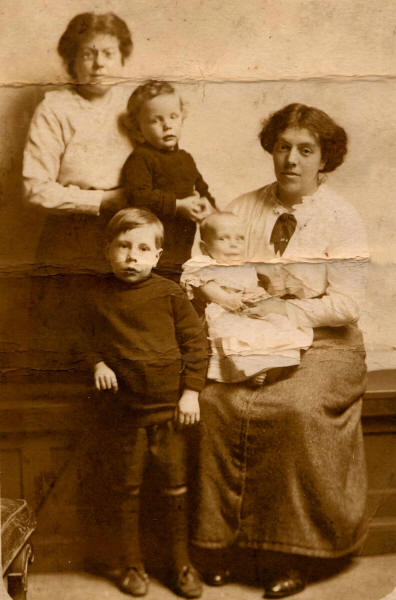
Sidney John Thomas Beck was born on the 2nd November 1915, the son of [A2] Reuben Alexander and [E1] Ruth Elizabeth Beck, at the family home at 31 Marlborough Road, Gillingham, Kent.1 As a child, he shared a bed with his brother Bill, in the attic bedroom, later moving to the back bedroom on the first floor.2

Sidney Beck, on his mother's lap,
with elder brothers and Aunt Maggie Petts
Around September 1920 he began attending school, at the Church of England Infants School adjoining St Mark's church, at the corner of Canterbury Street and Gillingham High Street.3
The 1921 census found him attending school full time, and living with his family and maternal grandfather in seven rooms at 31 Marlborough Road. That year, while his mother was expecting his youngest brother Edgar, Sidney and his older brother Alec were sent to spend some three months on his godmother's farm, near Sevenoaks. They attended school while there. This was the first occasion on which Sidney ever stayed away from home.4
Around September 1922 Sidney moved up to St Mark's Primary School—a much bigger school, about 2–300 yards away, down St James's Street, alongside the chutney factory, with its unforgettable smell. The primary curriculum was quite wide-ranging: in addition to reading, writing and arithmetic, Sidney studied English—composition, dictation, spelling, and poetry; art—pastel, pencil, object and flat, freehand and model; geography and maps; history; science and observation, handwork, homework, scale, and rules drawing; mathematics—geometry, trigonometry, "mech. mens.," and algebra. It was while at this school that he was once asked by the head teacher, Ernest Elleman, to say "Three frisky frogs" to a school inspector. The ignominy of his failure to achieve this always stayed with him. Elleman was renowned for his use of the cane, but he never caned Sidney—although he was once caned by another teacher; Sidney's marks for conduct were never less than 15 out of 20, and he got full marks three times. While at primary school he only missed seven days' schooling, and was almost never late for school. He began at St Mark's by gaining first place in a class of 44, and was always in the top three of his class, except for an almost inexplicable 20th in the Christmas term of 1925 (but this term saw four of the only seven days Sidney missed, so possibly his schooling suffered through sickness). From a young age, until he was 16 or 17, he also attended the Presbyterian church Sunday School.5
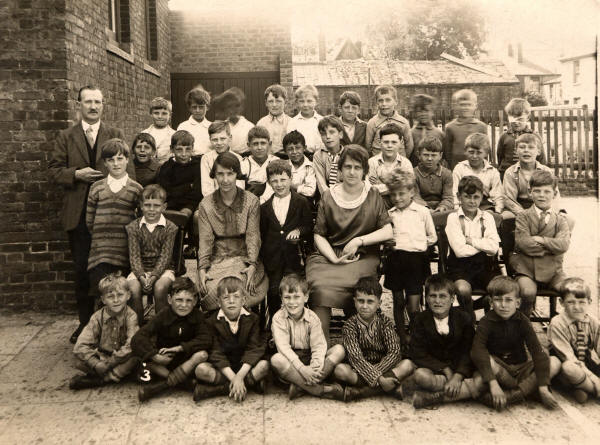
Sidney Beck (back row, 4th from right), with 1st form, St Mark's school, c. 1924
From about 1924 until the end of his primary school years, Sidney had a Saturday morning job working for Searles', the local greengrocer. He also earned the occasional sixpence by collecting buckets of horse-manure and selling them to local gardeners.6
In 1925 he was greatly impressed by attending the Empire Exhibition at Wembley. In the following year he remembered seeing Welsh miners in Gillingham collecting funds on street corners, during the General Strike.7
Around 1926 Sidney was in the Scouts for about a year.8
In about 1927 he went to Canterbury for a week, to stay with his Aunt Maggie and Uncle Arthur Petts. He was allowed to help out at the Pickfords' shop where Arthur worked.9
In September 1927, successful in the scholarship exam, Sidney moved up to the County Grammar School for Boys, in Third Avenue, Gillingham; his grandmother Louisa Beck kitted him out in his new school uniform.10
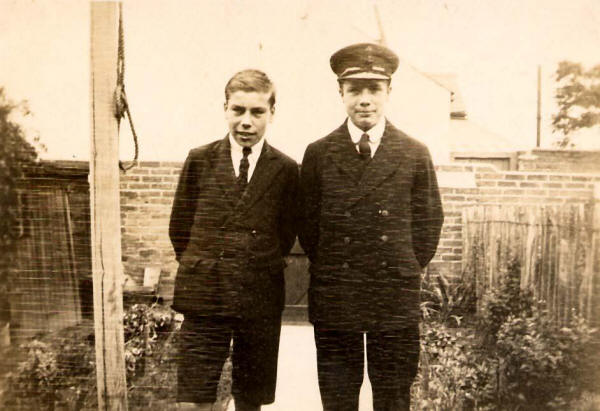
Sidney and Percy Beck, 1929
At the grammar school his sporting prowess came to the fore: in 1934—his last year there—he was captain of the school's 1st XI cricket team and rugby 1st XV. He also boxed and ran cross-country, though with less success. He was the school's mile walk champion, and held the record (8 minutes 123/5 seconds) for four or five years from 1932; in his teens, he used to walk a lot by himself. He played tennis on a site near Jezreel's Tower, in Gillingham. In his later teens he also played football for a Wednesday afternoon club made up of shop assistants, for whom he kept goal.11
This is not to say he neglected his studies. In 1931 he matriculated in English, Geography, French—written and oral, Arithmetic and Elementary Mathematics, Heat, Light and Sound; he attained a Distinction in History (English and European). His curriculum also included German, Chemistry, Scripture, Physical Training and Games. Although his school reports at this time gave him an A for conduct, they also record four detentions between 1927 and 1930. In July 1933 he took his London University Higher Schools Certificate. He wanted to take Maths, Physics and History, but was obliged to do Pure Maths, Applied Maths, Physics and Chemistry. In October that year he was considering his future:
During the last week I have been settling up the business of my going to college. If I become a teacher at all I should prefer to be a secondary teacher but this costs a good deal of money & I am not sure of obtaining a post on coming out. I also would like to take part in politics and am wondering whether this secondary school teaching business will not hamper my chances in this direction. I wonder whether this fad for politics is not just a passing craze as the age of 17 is the age when boys take interests in politics? Somehow I don't think that it is.12
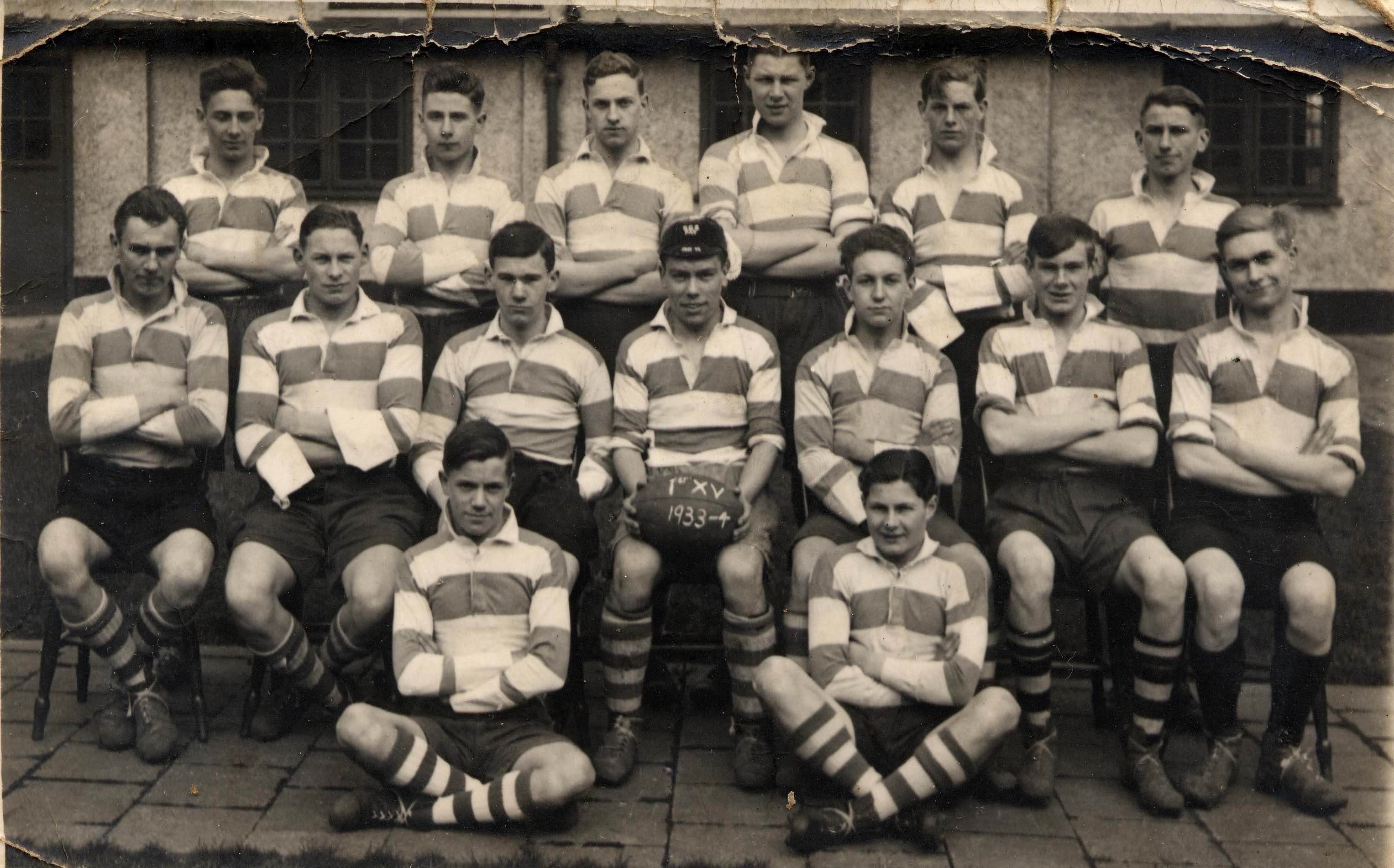
As captain, 1933-4 rugby 1st XV
In July 1934, he retook HSC in order to try and get distinctions in the same subjects; this he achieved in Physics, but he just missed it in Maths, by a couple of marks. In less serious vein, around 1934 Sidney took part in a debate at the school Debating Society, opposing the motion that "The Loch Ness Monster would not survive 24 hours in the summer waters of the Gillingham Swimming Pool"; the vote was eventually lost, after much merriment. His all-round ability led to his eventual appointment as school captain; his Spring 1934 report describes him as "Very sound & steady. He makes an excellent school captain," and in his final term his head master noted "A very satisfactory end to a most creditable school career. He has served the school well & takes with him the best wishes of all of us for a successful career in the future."13 If he had got distinction in Maths as well, Sidney would almost certainly have been offered a State Scholarship. In May 1934 he had, however, been offered a Kent Education Committee Foundation Scholarship in Mathematics at Southampton University, worth £50 p.a. At this time, he had also taken the Executive Officer examination for entry into the Civil Service. He had come 102nd, and they only wanted the first 80, but so many dropped out that he eventually came within the 80 remaining.14
In his school years he had developed an interest in astronomy, dating from his grandfather Walter Baggs showing him the book he had on the Moon.15 Sidney accepted the Civil Service post, without at that time knowing that he could have taken Astronomy as an option at Southampton—if he had known, then he probably would have done that. With hindsight, though, he felt he made the right decision at the time. Kent Education Committee would have demanded, by way of a repayment of their loan, that he teach for four years in a Kent school. As he later recalled, "I had to choose between teaching and the Civil Service and I chose the Civil Service because I couldn't see myself teaching for 40 years—the Civil Service seemed to offer more independence." Sidney never lost his interest in astronomy, being a member of the British Astronomical Association in the 1950s, and subscribing to astronomy magazines through to the late 1990s.16
Looking back in time, Sidney felt that he had a very happy childhood, indeed, that he couldn't have wished for a happier childhood.17
In October 1934 he started work in the Customs and Excise Department, at the Custom House, in Billingsgate, the Custom House quay, in the Pool of London, between London Bridge and Tower Bridge. Initially he went into the provincial salaries office, one of the two salaries offices, as a junior executive officer, supervising clerical staff in their more routine auditing, and doing special audits and other more specialized work. He worked from 9 to 4 or 10 to 5, and on Saturday morning 9 to 12 or 10 to 1, at £150 p.a., with six weeks annual holiday. In the context of the early thirties, "the fact that I was not only in paid employment but I was in an established job which guaranteed me employment for life, with a pension at the end, meant that I was in a very privileged position, compared with everybody else." His father rather resented his earning as much as him, at the start of his working life. At this time Sidney remembered his mother having trouble keeping the family fed and clothed, because pay was short.18
He found the work very interesting, and the company there congenial: he became very friendly with (later Sir) Norman Price, who was to become Chairman of the Board of Inland Revenue in the 1970s. He also found an outlet there for his sporting bent, playing cricket for the Accountant General's London staff.19
In 1935, at the Whitsun and August bank holidays, Sidney went camping, as he did at Whitsun 1936 and 1937. He first went abroad at this time, spending a holiday in Germany in September 1936, with a party of school friends. Not long afterwards he went on a day trip to Calais with his sister Gladys. In 1937 he holidayed on the Norfolk Broads.20
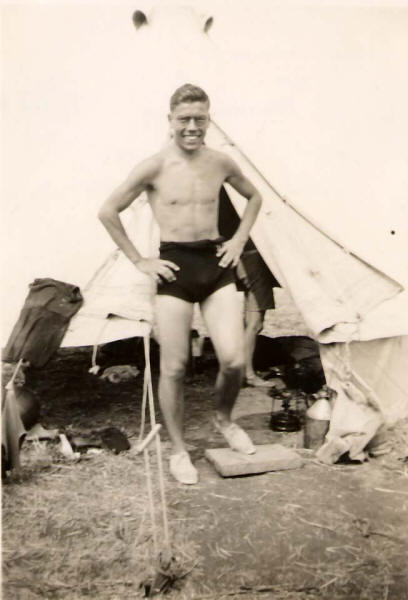
At Bay Camp, Tankerton, 9 August 1935
About 1938 he went into the Customs and Excise Inspection Branch, which involved travelling around provincial offices and ports, on a two weeks out two weeks back basis, which brought him into direct contact with the waterguard staff; he found this "quite an interesting practical sort of job", in which he learned a lot about commerce, &c. The intention was for him to serve two years on Inspection, and it was a sufficiently good opportunity that Sidney postponed the ideas he then had for leaving the Service in favour of "some real hard work."21
During these years before the outbreak of war Sidney commuted to London from Gillingham. He now had his own room at home. He had joined the Old Anchorians (his old boys' association), and played rugby and cricket for them till at least 1938 (his bowling average in 1936 was 6.74). Mostly he saved his money for holidays—walking holidays in the Lake District (1938), and the Chilterns. At this time he became increasingly sceptical about Christianity and religion, and though at one time had been going to be recruited as a Sunday-school teacher or superintendent, now gradually broke away from this. His diary treats of this in February 1937, referring to doubts initially being sown by his headmaster's lectures on comparative religion, then nurtured by conversation with the heretical Norman Price, who also encouraged him to read authors such as H.G. Wells. He altogether abandoned a belief in a personal God, and indeed of a personal afterlife. He found it less easy, out of consideration for others, and the prospect of losing the few friends he had, to abandon his Church associations. He finally broke with the church in May that year. He read a lot around this time, building up quite a little library of first edition Penguins and Pelicans, though at the time he regarded the serious reading he undertook as mere dabbling, "Sheer idleness and frippery." He subscribed to the first edition of T.E. Lawrence's The Seven Pillars of Wisdom—at that time he was under Lawrence's influence—and finished a week's holiday (beginning of July 1939) cycling round Devon and Cornwall by riding from Sidmouth to Basingstoke, calling in at Cloud's Hill (Lawrence's last home).22
In June 1938 Sidney wrote:
I am becoming impatient with myself & everybody. I am irritated by the inaction lack of constructiveness in myself & political & social organisations. I want to do something, get to work on some real work not routine unimportant clerical work such as the office provides. I want to work 16 hours a day to use my energy so that I can enjoy my rest. My holidays are becoming irksome. I do not feel I've earnt them, when I measure my work with that of outside people, men with families to provide for.
He considered becoming active in the Labour Party at this time.23
Sidney's diary first recorded his thoughts on the possibility of a second World War on the 23rd October 1933, while he was still at school. He wrote:
There may be a new race for armaments which can only mean another war. If so I shall take the head's advice and take morphia.
This particular option was never considered again, but what to do in the event of war remained a troublesome issue for him for a long time to come. Before the war Sidney had taken an interest in pacifism, and in June 1938 had considered joining the Peace Pledge Union, whose meetings he had attended in Rochester. He noted, however, that "I have not been able to reconcile conflicting viewpoints & I don't think I can give an unconditional pledge that on no account & in no circumstances will I fight." He was not altogether satisfied with the PPU, which he felt included too many religious, sentimental, or illogical people, but even so wrote that he would "undoubtedly be with them in resistance to what everyone is talking of as the Next War." When the time came, though, he felt impelled to rethink his views. On the 24th September he wrote:
And whatever I have thought or said I feel I cannot become a Conscientious Objector. It sounds like a denial, a traitorous betrayal of my principles, but in reality I feel that I am facing up to brute facts. Right up to Sept 1st I believed that Germany, or rather the Nazi Party, did not want war & was fundamentally peaceful. But the brutal invasion of Poland woke me up. [. . .] And now we are all agreed that this Nazi Govt. must be destroyed.24
He was recorded in the 1939 register as an executive officer, Customs & Excise, living with his family at 225 Marlborough Road, Gillingham; in that year his annual salary was £165. From around the beginning of the war until he was called up, Sidney was involved in the Federal Union—corresponding in the Chatham News and Kent Messenger, and starting a small branch in the Medway towns: he was FU's local secretary by December; in mid-December he was present at a WEA meeting in Chatham, at which the speaker was Richard Crossman, and he asked the latter for his opinion on Federal Union.24A When the war started, he was in Dundee. He came back to London, and was expecting to be called up but, not to denude staff too quickly, they delayed call up of the junior executive officers. He was given the job of arranging proper records of supplementary pay for customs staff who had been called up—and he did that for about a year. Some time in the middle of 1940 Sidney got his call-up papers. He was graded B3 at that time, because of his eyesight, so was allocated to the Royal Army Pay Corps, the section of the Pay Corps dealing with the Royal Corps of Signals, based at Caversham, Berkshire. On the 2nd September 1940 he was deemed to have been enlisted as no 7675859 in the Royal Army Pay Corps embodied Territorial Army, and posted to Reading Detachment. His job there was a very basic clerical one; on his 25th birthday he passed his trade test as a Clerk Class III. He was billeted out with a family in Reading.25
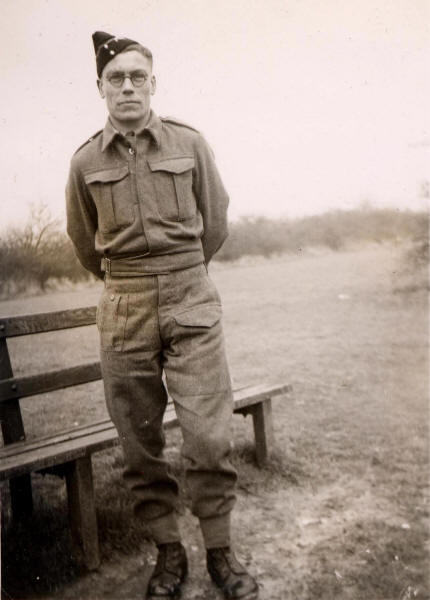
Near Guildford, 1940
On Friday, the 8th November 1940 he met [I1] Ruth Pollard at a badminton club, and before they'd known each other for more than 24 hours in total they became engaged. He first met Ruth's parents on the 12th December, at their home in Reading, and when they visited again on the 19th the visitors' book describes them as "verlobt"—i.e. engaged. Mary Pollard noted that:
He is evidently good & clever & thoughtful & seems much in love . . . Only getting about £250 a year at present. It's not ideal from our point of view, but R. is so very happy, & sure we shall like him & I think we shall.26
Planning to marry in June, Sidney took a couple of rooms at 2 Sidmouth Street, overlooking the Kennet, at a guinea a week. But they decided they weren't really satisfactory, and later rented a couple of rooms upstairs in a private house at 44 Culver Lane, Reading.27

44 Culver Lane
On the 2nd March 1941 Sidney passed his trade test as a Clerk Class II. Ruth and Sidney had a few days holiday together in Gillingham in mid April, during which Sidney acted as best man at his brother Bill's wedding (as he had at his sister's, in September 1940). At the end of that month Sidney was stricken with a mystery illness, and had to be taken to military hospital, before convalescing during May at Upton Court; from Upton Court he spent four days with the Pollards in Reading.28
Sidney had experienced some direct bombing during the phony war, September 1939 to 1940. In this period, and up to Dunkirk, he had been a Local Defence Volunteer, parading in school playgrounds with a broomstick rifle, and guarding the gasworks at night-time. He had witnessed some spectacular action in the Battle of Britain, over Chatham. He continued fire-watching through to at least November 1942, guarding variously the Corn Exchange, Caversham Hall, Huntley & Palmer's, St Anne's Hall, Balmore Hutments, and "Plasterboard huts"; in December 1941 he had a letter published in Time & Tide, on 'Marco Polo on Fire-Watching'.29
Sidney and Ruth were married at the Friends' Meeting House in Church Street, Reading, on the 7th June 1941, Sidney being permitted to marry in civvies (described on the certificate as "Private in H.M. Army, no. 7675859 (Civil Servant)". The couple honeymooned in Hope Cove, Devon, returning to 44 Culver Lane on the 13th. It was not till December that they exchanged wedding rings.30
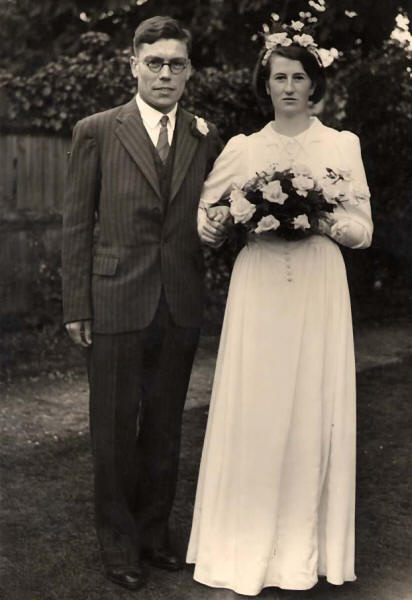
Sidney and Ruth Beck, 7 June 1941
The Reading Standard30A reported that
The wedding took place at the Friends' Meeting House on Saturday of Mr. Sidney John Thomas Beck, son of Mr. and Mrs. R.A. Beck, of 225, Marlborough Road, Gillingham, Kent, and Miss Ruth Pollard, B.A., daughter of Mr. and Mrs. F.E. Pollard, of 22, Cintra Avenue, Reading.
The Bride wore an ankle length gown of white crepe-de-Chine and carried a bouquet of yellow roses and wore similar roses in her hair. The two small attendants were Rowland and Rosemary Dale (nephew and niece of the bride). The little girl was in a white silk dress smocked with green and carried sweet peas. She had similar flowers in her hair. The boy wore a white silk blouse with green tie and green knickers. The former wore a green and gold pendant and the boy a gold tiepin, the gifts of the bridegroom. Mr. Edgar Beck (brother of the bridegroom) was best man.
Within three days of the wedding, Sidney was regraded as a War Substantive Lieutenant; on the 23rd October 1941 he passed his trade test as a Clerk Class I; and in November 1941 he was described as a Temporary Captain. It may be, however, that these ranks were really 'paper' ranks, to keep his salary comparable with pre-war levels. The M-O diary entry for the 7th January 1942—"The Sergeant informed me to-day that he had been trying to get a stripe for me but that the office had its full complement of N.C.O.'s"—seems to confirm that Sidney was actually still a private. In the same month a former colleague told him that if he hadn't been conscripted he would by then be a Higher Executive Officer on around £250 p.a.31
In November 1941 his name was among those sent to the War Office re "Radiolocation", i.e. radar; but nothing seems to have come of this. In December Sidney described himself as "No. 2 Clerk dealing with all correspondence & payments"; they were introducing a new Process System in the office, "'Henry Ford' system as it is called by the men." In March 1942 he was busy preparing the Main Issue of Army Allowance Books. From New Year's Day 1942 Ruth and Sidney had become Secretaries of the Reading branch of Federal Union; Sidney introduced a discussion on the subject at a branch meeting in mid-January.31A In February Sidney sent the Federal Union head office some slogans, including one—"The FUture begins with Federal Union"—that they decided to use for advertising on the back of bus and tram tickets in Birmingham. The following month Sidney had to take the chair for part of a FU Regional Council meeting. His association with FU continued till at least the 9th November, when he noted that he had chaired an FU meeting. Around this time Sidney was also—with his father-in-law Frank Pollard—on a local Committee about Food Relief to Europe. In the 1940s Sidney was a regular contributor to Mass-Observation.32
On the 11th January 1942 Sidney spoke at Reading meeting, on a text from Paul. Ruth wrote:
. . . and then Sidney spoke really beautifully. I went hot and cold all over when he got up, but as soon as he started was no longer nervous. He didn't sound nervous, but was very much so when he sat down—a sort of reaction.33
Sidney's sporting activities continued through this period. In March he competed in a cross-country relay race, running 2½ miles in a gratifying 13 mins 2 secs. Later that month he played right half in an inter-office football match, winning 4–2—though in April, when he played in goal for the first time for years, his team lost 8–3—not entirely his fault, he maintained. At one of these matches he slightly dislocated a finger, which was still giving him trouble in the summer, even after having it set in plaster.34
Towards the end of March Sidney noted "I have become almost convinced that invasion of British Isles will be attempted soon."35
In late March 1942 Sidney was subjected to a military trial before his Colonel, on a charge of refusing to attend Church Parade; he argued that he shouldn't have to, as he was agnostic, not C of E. It was a serious matter, and could have resulted in a sentence to detention, but the Colonel decided it was a matter of conscience rather than indiscipline and went no further than issuing an admonishment. At the end of May Sidney's papers were amended to show that he was an agnostic. Possibly Sidney's earlier refusal to aid his commanding officer in obtaining over-ration meat may have been a contributory factor to this action being taken against him.36
In late 1942—according to Sidney's later recollections—an army order was issued that all recruits labelled B3 should be regraded as A1. Sidney was effectively under notice that some time he would be called into combatant duties. He accordingly chose to apply for a commission, first as a glider pilot, and then as a Royal Artillery officer. This was a controversial decision, which caused much anguish to his pacifist wife, and their young marriage was probably never troubled more greatly than at this time.37
Sidney's own Mass-Observation diary—and Ruth's—put a slightly different light on this period, suggesting that his memory had rather telescoped the sequence of events, and had perhaps downplayed his own insensitivity over the matter. He was actually among the A1 men who were informed on the 21st May 1942 that they would soon be transferred, and had been invited to volunteer first. Sidney noted:
Some difficult decisions to make to-day. I feel it my duty to volunteer for the most arduous work (although, being a clerk, I anticipate I shall only get further clerical duties in the R.A.C.) I wanted to get into the Army Cooperation Flying Unit, but the Wing officer could not give me any information on this aspect of the Army. So finally volunteered for the R.A.C. This must have been an old subconscious decision. I do not remember ever having consciously decided to volunteer for the R.A.C.
Ruth told of his breaking the news:
Sidney came up later, and we came home about 8.0. During supper he broke the news that the A1 men had been called in, told they would soon be transferred, & asked if they would like to volunteer first, and he chose the Royal Armoured Corps—tanks.
According to Sidney:
Ruth, naturally, very upset at my announcement and we must wait and see how events affect our lives. I hate compromising her conscience but I cannot escape my duty, as I see it.
Nothing came of this first application, so in July Sidney volunteered to be a glider pilot, again unsuccessfully. On the 22nd of that month Sidney recorded:
In evening, Ruth & I began arguing Pacifism & our attitude to war. We both hoped that we could convert the other to our own point of view when we were married, but find we are becoming more & more confirmed in our own views with less toleration of the other's point of view. May be because of the uncertain future.
He was interviewed for the Unit Selection Board at the beginning of November—actually on his 27th birthday—and was recommended to the War Office for the R.A. (Field).38
On a lighter note, Sidney had a letter in the Reading Standard38A in September:
Sir,—Your readers may be interested to know that on Monday afternoon, while boating in Caversham Reach, my wife and I saw a cormorant on the top branch of a tree on the north bank of the river. As this bird is a rare visitor to inland waters and we believe is rarely seen in trees, we should be interested to know whether your readers can recall similar visits of this bird in the neighbourhood of Reading.—Yours faithfully,
S.J. BECK.
44, Culver Lane,
Earley.
At the end of December Sidney was notified that he had been successful in his application for an RA officership, and was sent down to Wrotham, Kent, for pre-OCTU training—intensive training in all aspects of army life, for about seven weeks, in which he learned to ride a motor cycle, and drive a 3-ton lorry. On the 18th February 1943 he went to the 123 Officer Cadet Training Unit at Catterick, the big Artillery training centre. He was there when his first child Daniel was born; though he had special leave, Daniel was overdue, and he was not able to see him till a few days after the birth. At Catterick he learned all the basic skills, like Morse code, wireless operation, the routine of gun drill. Training lasted about three months, including a week at practice camp at Patterdale, in the Lake District. Sidney was second-best cadet in his troop, and was second-in-command of the passing-out parade. He was advised to apply for a motorized armoured unit; at that stage the unit to which he was sent, the Hertfordshire Yeomanry, wasn't such—but the guns were eventually put onto tank chassis.39
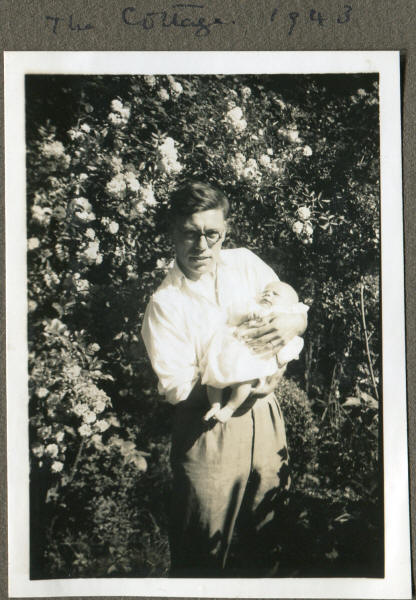
Sidney and Daniel Beck, 1943
On the 3rd July Sidney was discharged from the RAPC, the following day being appointed on an Emergency Commission as a 2nd Lieutenant in the Royal Artillery. His service record describes him, around this time, as 5' 7¼", weight 151 lbs, with brown eyes and brown hair; Ruth admitted, perhaps grudgingly, that he "looked very smart" in his new uniform. On the 11th July he was posted to the 86th Field Regiment as P284144, Royal Artillery, and went down to Wiltshire, where he joined the Hertfordshire Yeomanry (St Albans battery) near Salisbury training camp, where the unit were doing firing exercises; within two weeks he moved to Bournemouth, and then to Kilmarnock, in Scotland, where he was assigned to a motor-cycle to keep a check on the convoy of vehicles going up to Scotland. At Kilmarnock the regiment was equipped with armoured vehicles—guns on tanks; they already knew they were to take part as a support group to a landing party, though didn't know exactly where. They trained for D-Day operations at Tighnabruaich, practising loading onto ships, and operating their guns while steaming towards the beach—they already had special landing vehicles. Training from here onwards was more or less dress-rehearsals right up until D-Day. At the beginning of September Ruth noted that Sidney was "busy road-making", and—ironic, in view of his trial in March—"Sidney had to lead the men in prayer!" Under the impression that his stay in Scotland would be for several months, Ruth and Daniel moved up to join him in October, taking rooms at 2 Fairlie Avenue, Kilmarnock. In November, however, Sidney was moved to Norwich, and his family returned to Reading.40 On the 4th of January 1944 Sidney was appointed a War substantive Lieutenant. After wintering in Norwich, the regiment went down to Bournemouth, for further practice on the south coast. Ruth and Daniel joined him in Bournemouth in March.41
On the 3rd June 1944 Sidney embarked for North-West Europe. On the 5th he started off with the invasion fleet, but bad weather forced them back. At 8:15 a.m. on the following day—D-Day—Sidney landed with his regiment on Gold Beach (King Sector), Normandy, disembarking from LCT 502 on the beach near Khartum exit west of La Riviere (Alberta). They first went into action 500 yd off the beach in front of the casemate of a German coastal battery. The remainder of the war in North-West Europe is well-known, and Sidney's own experiences are amply documented in the diaries he kept till his demobilization, in the form of letters home to Ruth and the battery diary he wrote in 1946. There is no need, therefore, to amplify further on this period of Sidney's life.42
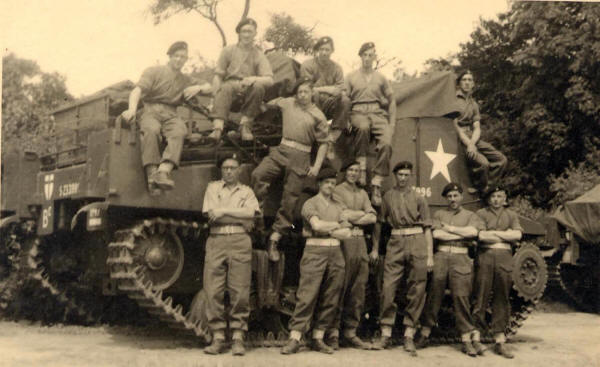
Verden, May/June 1945
As the war ended, Sidney had been detailed to go to the Far East, but he was spared by VJ Day (as at 5th August 1945 a posting to South East Asia Command was still on the cards). His contingency plan had been to apply for a job in the Senior Branch of the Foreign Office, which would have secured his immediate release from the Services. Instead he remained in Verden, in Germany, as part of the occupying forces. On the 30th August 1945 Sidney was appointed Acting Captain, and on the 30th November promoted to Temporary Captain. He found a new role as ABCA officer (Army Bureau of Current Affairs) in Germany after the war. For a month, from mid-February to mid March 1946, he took 100 hours of courses in Government and Politics, French, and Drawing, at No 7 Formation College of the Rhine Army, at the conclusion of which his report said "Excellent. Made important contribution to work of syndicate," and his Colonel's recommendation was "Admirably suited for a full course at a university."43
At the end of March 1946 he was demobbed, with the honorary rank of Captain, finally disembarking in the UK on the 25th May, and returning home to Reading. He wasn't formally released from the services until the 14th August. He was awarded the 1939–45 Star, the France and Germany Star, the Defence Medal and the 1939–45 War Medal.44
In June, after a fortnight with his family (now including a daughter, Julia, born in 1945) in Bournemouth, and six days with Ruth's parents in Reading, Sidney returned to the Customs and Excise. With the ending of the war the size of the department rose dramatically, partly as a result of returning Servicemen. New pay scales were introduced consolidating the war bonuses, which again had been a feature of the wartime salaries. Sidney had been promoted in absentia, so returned to Customs as Higher Executive Officer, in his section (the Accountant and Comptroller General's Office) an Assistant Accountant—at quite a considerable increase in salary: £550. His office was at City Gate House, Finsbury Square.45
In October 1945 Sidney was recorded in the Services electoral register at 22 Cintra Avenue. Around this time the family moved to London, buying a house at 20 Fortis Green Ave, London N2 (tel. TUDor 6800); they spent Christmas week of 1946 in Reading, and two weeks at (Ruth's mother's) Mushroom Cottage in August 1948. It was at this period that Sidney acted as Black Rod of the 'Muswell Hill Parliament,' and appeared on TV, in the first ever televised 'state opening of Parliament.' There were to be two further children while in London: Lucy Ruth (1948), and Benjamin Sidney (1951).46
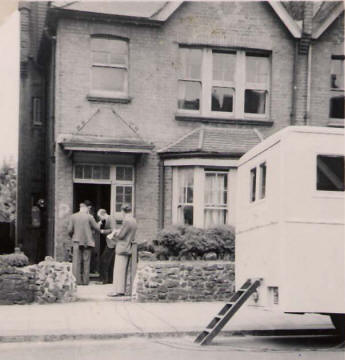
20 Fortis Green Ave, 1949
Sidney was an active trade unionist at this time. He was a member of the Society of Civil Servants, and after a time was on the committee of the accountants' office group, and later was Treasurer of the whole branch of EOs in the Customs and Excise. In May 1950 he attended the annual conference of the SCS at Margate, as a part of the delegation from the Customs. He was on the branch committee about three years, then served about three years as Treasurer. After a change in the subscription system, which reduced the powers of the local treasurers, he became a rank-and-file member again.47
In need of a bigger house, on the 26th October 1951 the family moved to St Albans, buying a five-bedroomed house at 50 Clarence Road (tel. St Albans 5390, later 55390). "It was the day the General Election results were announced & we just got the wireless working in time to hear that Mr. Churchill was the new Prime Minister."48
In December 1952 Sidney took the Chair at
a Parents' Protest Meeting, protesting at the Council's change of mind in
deciding not to offer new premises to Fleetville primary school. The protest had
been initiated by a letter of Sidney's to the Herts Advertiser in the
previous month. In January 1953 he followed up the protest meeting by heading a
deputation to the Ministry of Education. The protest failed to change the
decision, but led to the provision of new facilities at the existing school.
This in turn led to Sidney becoming a Manager of Fleetville School, for a while
(he was still a member of the Fleetville PTA in 1955).49
month. In January 1953 he followed up the protest meeting by heading a
deputation to the Ministry of Education. The protest failed to change the
decision, but led to the provision of new facilities at the existing school.
This in turn led to Sidney becoming a Manager of Fleetville School, for a while
(he was still a member of the Fleetville PTA in 1955).49
In July 1953 Sidney was promoted to Accountant in the Inspection department of the Accountant General's office. The new post involved much travelling, beginning that month with a tour of duty in the Aberdeen area. In the next two years inspections took him to Reading, Plymouth, the North-East coast, Hull, Grimsby, Hampshire and Dorset coastal ports, Edinburgh, Nottingham, and Manchester.50
In mid July 1955, Ruth was ill with glandular fever, then had a severe asthma attack. Sidney had to cancel his intended inspection visit to Dundee. As a result he was taken off Inspection and transferred to Organisation and Methods work, first attending a Treasury course on the subject in February 1956.51
In 1957 he was appointed as Auditor of the Customs Fund. In 1958 he was promoted to Chief Accountant in Division E of the Customs (the Accountant and Comptroller General's Office)—and in 1962 he secured a further slight step up to the same post in Division F. Through the 1950s and into the early '60s Sidney was still a keen cricketer, playing for the AC&G's office (for whom he was captain, in 1959), as well as (at least once) the St Albans III team; he was particularly strong as a bowler, and in 1964 it was said that "Beck . . . in his time has probably contributed more than anyone to A.G.'s cricket."52
In the early 1960s Sidney was Secretary of the St Albans branch of the Direct Action Committee against Nuclear War, and later the Campaign for Nuclear Disarmament, and in April 1960 took part on the first day of the Aldermaston March. In 1962 he also marched part of the way, and attended the rally in Trafalgar Square. In 1962 and 1963 he was Chairman of St Albans CND. Later these activities were curtailed by the direction in which his employment took him.53
In the summer of 1961 Sidney went on a cruise on the Baltic, with his family, calling at Copenhagen, Stockholm, Helsinki and Leningrad. 1962 saw the family holiday in Cornwall, and the following year in north Italy. In a potted biography written for the St Albans Debating Society in October 1963, Sidney emphasized that he was a Man of Kent, and mentioned—in addition to CND—that he was Treasurer of the Civic Society (of which he had been co-founder in 1961), and a member of the United Nations Association and the Archaeological and Architectural Society. "In spare time watches cricket, is a keen cine photographer and is interested in newspapers, even, quotes Mrs. Beck, on holiday!" Sidney took an active part in the Debating Society, at which he was the proposer of motions in debates reported in the Herts Ad in 1963 and 1969.54
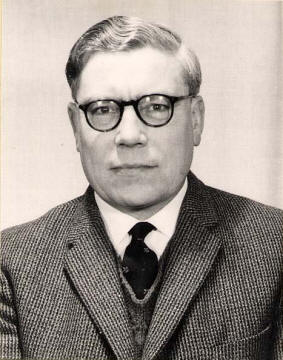
April 1963
In March 1964, and again in May, Sidney visited Brussels, to act as Auditor for the Customs Co-operation Council. In October or November of the same year, as a Chief Executive Officer, he was seconded from Customs to the Organisation and Methods department of HM Treasury (OM1 Division).55
In the summer of 1966 Sidney holidayed with some of his family in Greece. In May 1968 Sidney and Ruth were on a short holiday in Paris when, by exhilarating coincidence, the celebrated near-revolution took place. In August 1969 they holidayed in Northumberland, the following spring in Austria, 1971 Norway, and 1972 Switzerland. In 1973 the main family holiday was at Goathland, but they had spent a week in Germany earlier in the year.56
In June 1968 the Fulton Report was published. One of its major proposals was the formation of a Civil Service department to take over the management functions of the Treasury, and also to absorb the Civil Service Commissioner, the recruiting department. Furthermore, it recommended that organization and methods units should be established in all major departments to ensure the better and more efficient use of resources. From this point, Treasury O & M became the Civil Service Department's O & M branch, to which Sidney was further seconded.57 In this post Sidney was liaison officer for a number of departments, including the Ministry of Defence. This involved liaising over NATO standardisation of weapon nomenclatures, as well as for the top secret Government Communication Headquarters (GCHQ) in Cheltenham. Sidney successfully withheld all knowledge of this area of work even from his own family, until several years after his wife's death.58
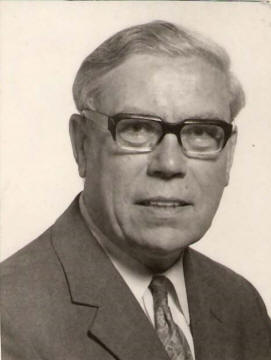
July 1973
Less controversially, he also worked with the Ordnance Survey department, and Exchequer & Audit Department. It was through the latter assignment that Sidney secured a completely new post—no longer a secondment—working as a Chief Executive Officer (later, Principal) for the newly-established Parliamentary Commissioner for Administration, or Ombudsman. On the 13th October 1969 he started work in his new office at Unit 5, Church House, just across the road from, and in the same street as, his previous job.59
On his 54th birthday he recorded that:
I have a queer mixture of complaints on the go at the present time. A broken contract, two cases of complaints about delays in Board of Trade in bankruptcy proceedings, two Investment Grants (one dealing with "Pea Pickers" and the other a machine for sowing seeds on highway verges), a building grant for a Night Club in Consett, Durham, a 30 mph speed limit sign at the village of Winslow, Bucks, Noise at London Airport, and a claim for compensation on a house near Birmingham Airport! A very mixed bag. I expect some cases will take me a year! Also I have a new case about the Ferry boat between the Isles of Jura & Islay, which the owners want to operate with a crew of 2 & the Board of Trade say you must have 3 in the crew for safety! You need the judgement of Solomon to draw the line in some cases!60
In the six years prior to his retirement in 1975 he served as a Principal in the Office of the Parliamentary Commissioner for Administration under the first two Ombudsmen, Sir Edmund Compton and Sir Alan Marre. This, Sidney felt, was in some ways the most interesting phase of his Civil Service career.61
In the early summer of 1975 Sidney and Ruth spent a fortnight in the French Pyrenees. Sidney retired in October 1975, working his last day on the 31st of that month. On the train home from St Pancras he observed a very fine red sky sunset, "and I thought this was a rather fitting way to close a life of 41 years in the Civil Service." Sidney later reflected that if circumstances had been a little more favourable in one or two areas, thus freeing him to make the optimum decisions, he was sure he could have ended up as Accountant General of the Customs and Excise; nevertheless, he was quite happy with the path his career actually took. In January 1976 the Becks began househunting in Yorkshire, looking first at Skipton and Ilkley, straightaway being impressed by the latter. In March that year they spent a fortnight in the Canaries. On the 4th June Sidney went to Ilkley to view 44 St James Road. On the 15th he offered £14,250 for the property, and two days later settled for £14,500. On the 25th June 50 Clarence Road went on the market with an asking price of £23,750, and on the very same day an offer of £23,500 was accepted. On the 25th October 1976 Sidney and Ruth Beck moved out of 50 Clarence Road, and the following day they moved into 44 St James Road, Ilkley, West Yorkshire—a smaller house, with a pretty garden and a stream (the Parish Ghyll) running past at the back. (From 29th June 1977 the phone number was 0943 609064.)62
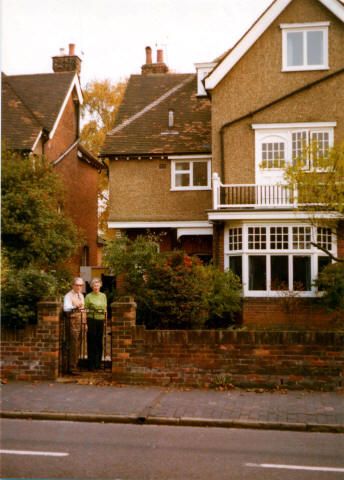
50 Clarence Road, 1976
During the '60s and early '70s Sidney had been actively involved in the St Albans Civic Society, of which for a time (by 1970) he had been Chairman (in 1963 and 1964 he had been Treasurer, and at some point in the '60s Vice-chairman). He quickly got involved in the Ilkley Civic Society, too, and by 1980 was Chair of their Conservation Sub-Committee, becoming Secretary of the Civic Society in 1983, a post he held until 1986. In 1976 he had been temporary secretary of the St Albans branch of the European Movement. By April 1977 he was Secretary of the Ilkley United Nations Association.63
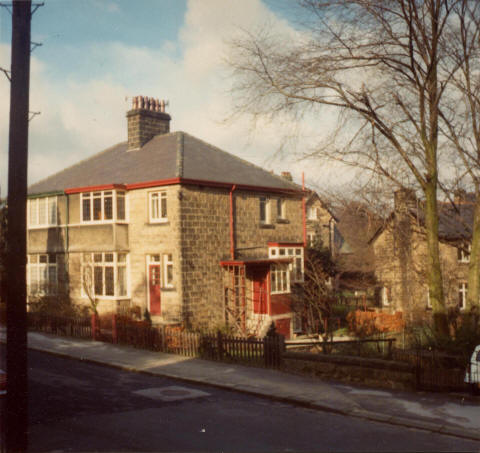
44 St James Road, 1977
In the spring of 1979 Sidney and Ruth spent a fortnight in Kos and Mykonos. In June 1981 Sidney and Ruth went on a ruby honeymoon to Hope Cove, scene of their first. In the spring of 1982 the couple holidayed in Norway. From around 1982 to 1986 at least, Sidney was Treasurer of Ilkley Preparative Meeting.64
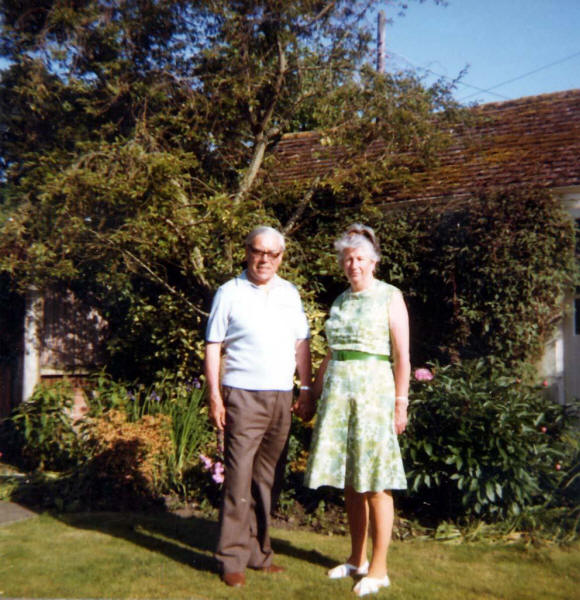
Sidney and Ruth Beck, June 1981
In December 1982 Ruth died quite suddenly, leaving Sidney potentially quite isolated, in the Yorkshire Ruth had brought him to on their retirement. Sidney, however, had already made friends locally, and soon bought a car (delivered 30th September 1983, a red Austin Metro automatic, reg. A409 LWT), to enable him to keep in touch more easily. After forty years as an Attender at Quaker meeting, on the 10th March 1984 Sidney was finally accepted as a full Member of the Society of Friends. On the 3rd December that year he attended his first meeting of Elders and Overseers, though it's not clear whether this was as Treasurer or because he had become an Elder or Overseer.65
In the spring of 1983, and again in 1984, Sidney took satisfaction in collecting frogs and toads, at risk crossing the road to the pool in the convent garden in Ilkley. In later life his reading favoured C.P. Snow and Anthony Trollope, as well as Tolstoy. In July 1983 Sidney had eye trouble, diagnosed as deterioration of the viscous humour, but not glaucoma, as he had feared. In July the following year he was told he needed an operation for a small tear in the retina of his right eye. On the 30th August 1984 he had crio-surgery at the Bradford Royal Hospital, under a general anaesthetic. In September 1984 he was a co-executor of the wills of Robert S.W. and Beatrice E. Pollard, his brother and sister-in-law, and for the former role was bequeathed £200.66
From around April 1984 Sidney formed an attachment with a recent widow and retired teacher, Marian Palmer. They went for long walks together, with the Evergreens walking club. On the 12th December 1984 they decided to marry, though Sidney's diary entry for that day records the decision as having been the "sense of the meeting"—the discussion they'd had that day over a pub lunch—rather than anything more positive. By early January 1985, it was widely understood that marriage was in the air. In the end, however, Sidney and Marian decided not to marry, but for Sidney to move in with Marian to her home at 10 Eaton Road, Ilkley. 44 St James Road was finally handed over to its new purchaser on 27th May 1985.67
At the beginning of May 1988, accompanied by Marian, Sidney revisited the Normandy beaches, for the first time for 44 years. He became quite a traveller during his life with Marian: later in the same year, and again in 1990, they visited the USA; and later in 1990 they visited Zimbabwe together. 1990 also saw a family gathering in Whitby, in honour of Sidney's 75th birthday; this was particularly memorable as the only occasion on which Sidney was ever united with all his children and grandchildren and their families, at the same time.68
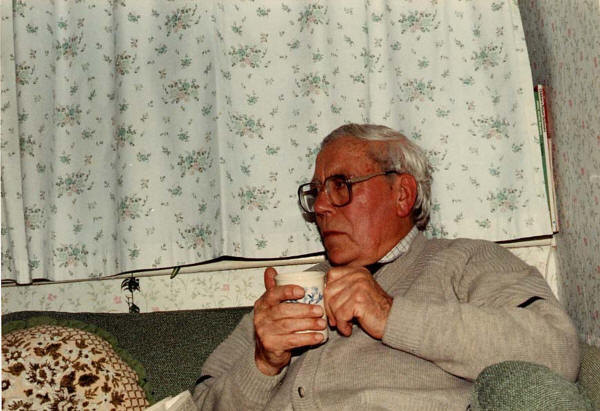
Sidney Beck, 14 December 1989
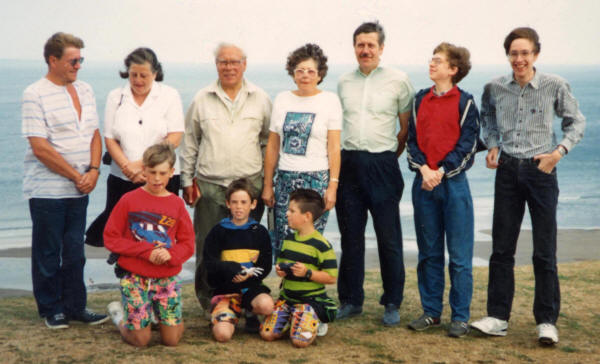
With all his children and grandchildren, Whitby, August 1990
In 1994, on a visit to Coutances in Normandy (Ilkley's twin town), Sidney was presented with the Normandy medal, fifty years on from D-Day.69
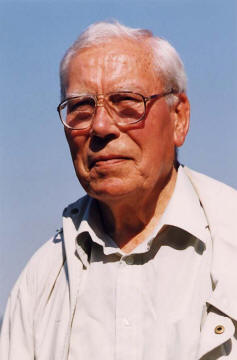
c. 1994
At the end of October 1994 Sidney was operated on for the removal of a tumour from his bowel. By October the following year, it was confirmed that the cancer had spread to his liver. He began a course of chemotherapy in November.70
The following year Sidney celebrated his 80th birthday (five days early), with dinner at the Rombalds Hotel in Ilkley, in the company of all his children, four of his grandchildren, and Marian.71
Sidney last revised his will on the 18th July 1996; in addition to provision for his children, he left £1000 each to his sister Gladys Mills and sister-in-law Daphne Beck, as well as all his personal chattels to Marian Palmer. In May 1998 he was admitted to the Ardenlea Marie Curie hospice, in Queens Drive, Ilkley, where he died at half past midnight on Monday the 15th June; the cause of death was given as carcinoma of the colon. His body was cremated on Friday the 19th June, at Rawdon crematorium, Leeds Road, Leeds. His will was proved at Leeds on the 25th September 1998, the gross value of his estate being £157,679.72
1 birth certificate—which gives his first name as "Sydney", a spelling never later used. The house was later renumbered as 225 Marlborough Road.
2 interview with Sidney Beck, begun Easter 1986
3 interview with Sidney Beck, conducted by Benjamin Beck & Debbie Wells; transcript by BSB; Ms Memoirs, Sidney Beck; interview with Sidney Beck, begun Easter 1986. The building has since been demolished.
4 TNA: RG 15/4087 RD47 SD2 ED17; interview with Sidney Beck, begun Easter 1986; letter to me from Sidney Beck, 1985-12-20; his godmother was Ruth E. Beck's cousin Elizabeth ____, née Booker.
5 Ms Memoirs, Sidney Beck; interview with Sidney Beck, begun Easter 1986; SJB's MS notes on Neil Bell: My Writing Life, in my possession; my own knowledge; letters to me from Sidney & Ruth Beck; scrap book of newspaper cuttings 1952–75, compiled by Sidney Beck; Sidney's earliest school report is from December 1923, so possibly it was then, rather than 1922, that he began at St Mark's. I don't know what 'mech. mens.' means: presumably some form of applied mathematics.
6 interview with Sidney Beck, begun Easter 1986; information from Sidney Beck; Searles' address in 1935 was 145 Canterbury St—my own knowledge
7 interview with Sidney Beck, conducted by Benjamin Beck & Debbie Wells
8–9 interview with Sidney Beck, begun Easter 1986
10 interview with Sidney Beck, conducted by Benjamin Beck & Debbie Wells; interview with Sidney Beck, begun Easter 1986; Ms Memoirs, Sidney Beck
11 interview with Sidney Beck, begun Easter 1986; information from Sidney Beck
12 interview with Sidney Beck, begun Easter 1986; Ms Memoirs, Sidney Beck; scrap book of newspaper cuttings 1952–75, compiled by Sidney Beck; b42—source reference corrupted; b43—source reference corrupted; Sidney Beck: Ms Diary
13 interview with Sidney Beck, begun Easter 1986; Ms Memoirs, Sidney Beck; scrap book of newspaper cuttings 1952–75, compiled by Sidney Beck; b42—source reference corrupted; b43—source reference corrupted
14 interview with Sidney Beck, begun Easter 1986; S.J. Beck 'Snaps' album, 1920s—1930s; b43—source reference corrupted; The Times, 1934-05-30
15 interview with Sidney Beck, conducted by Benjamin Beck & Debbie Wells; the book was probably J. Nasmyth & J. Carpenter's The Moon: considered as a planet, a world, and a satellite, 2nd edition 1874, with 24 Woodburytype illustrations; I now have Sidney's copy, which is presumably the one he inherited from his grandfather.
16 interview with Sidney Beck, conducted by Benjamin Beck & Debbie Wells; interview with Sidney Beck, begun Easter 1986; letters to me from Sidney & Ruth Beck; scrap book of newspaper cuttings 1952–75, compiled by Sidney Beck; my own knowledge
17 interview with Sidney Beck, begun Easter 1986
18 The London Gazette, 1934-11-09; interview with Sidney Beck, conducted by Benjamin Beck & Debbie Wells; as a male executive officer his starting salary would actually have been £152 (1935 Imperial Calendar)
19 interview with Sidney Beck, begun Easter 1986
20 interview with Sidney Beck, begun Easter 1986; Ms Memoirs, Sidney Beck; S.J. Beck 'Snaps' album, 1920s—1930s
21 interview with Sidney Beck, begun Easter 1986; Sidney Beck: Ms Diary
22 interview with Sidney Beck, begun Easter 1986; b43—source reference corrupted; S.J. Beck 'Snaps' album, 1920s—1930s; Sidney Beck: Ms Diary. Presumably this was not, in fact, the now very rare 'Subscribers' Edition' of 1926 but the 1935 edition published after Lawrence's death.
23 Sidney Beck: Ms Diary
24 interview with Sidney Beck, begun Easter 1986; interview with Sidney Beck, conducted by Benjamin Beck & Debbie Wells; Sidney Beck: Ms Diary
24A Chatham News, 1939-12-01 and 1939-12-22; 1939 Imperial Calendar. In the 1970s Sidney was to avidly read through Crossman's Diaries of a Cabinet Minister as they were published.
25 1939 England and Wales Register (TNA: PRO RG 101); interview with Sidney Beck, begun Easter 1986; Ms Memoirs, Sidney Beck; service record; Chatham News, 1939-12-15
26 Sidney Beck: Testimony to the Life of Ruth Beck of Ilkley Meeting, and the two earlier drafts; interview with Sidney Beck, begun Easter 1986; diaries of Mary S.W. Pollard (Ms); Visitors Book, Frank & Mary Pollard, 1928–61; Sidney Beck: Ms Diary; Frank and Mary Pollard visitors' books
27 diaries of Mary S.W. Pollard; interview with Sidney Beck, begun Easter 1986
28 diaries of Mary S.W. Pollard; Sidney Beck: Ms Diary; service record; Frank and Mary Pollard visitors' books
29 diaries of Mary S.W. Pollard; interview with Sidney Beck, begun Easter 1986; Sidney Beck: Ms Diary; Sidney Beck's Mass-Observation diary (D 5021); Time & Tide, 1941-12-06
30 marriage certificate; Sidney Beck: Testimony to the Life of Ruth Beck of Ilkley Meeting, and the two earlier drafts; letters to me from Sidney & Ruth Beck; diaries of Mary S.W. Pollard; Sidney & Ruth Beck's Mass-Observation diaries (D 5021 & D 4247); The Friend 139:756 1981-06-12
30A Reading Standard, 1941-06-13
31 Army List; diaries of Mary S.W. Pollard; service record; Sidney Beck's Mass-Observation diary (D 5021)
31A Reading Standard, 1942-01-16
32 diaries of Mary S.W. Pollard; letter from Dorothy Sheridan, Tom Harrisson Mass-Observation Archive, to me; Sidney Beck's Mass-Observation diary (D 5021)
33 Ruth Beck's Mass-Observation diary (D 4247)
34-5 Sidney Beck's Mass-Observation diary (D 5021)
36 diaries of Mary S.W. Pollard; information from Sidney Beck; Sidney Beck's Mass-Observation diary (D 5021)
37 my own knowledge; information from Sidney Beck; interview with Sidney Beck, begun Easter 1986; Ruth Beck's Memoirs, and Sidney's 1981 Appendix to them
38 Sidney & Ruth Beck's Mass-Observation diaries (D 5021 & D 4247)
38A Reading Standard, 1942-09-04
39 interview with Sidney Beck, begun Easter 1986; diaries of Mary S.W. Pollard; service record; Ruth Beck's Mass-Observation diary (D 4247)
40 Army List; diaries of Mary S.W. Pollard; letters of Mary Pollard; interview with Sidney Beck, begun Easter 1986; service record; Ruth Beck's Mass-Observation diary (D 4247); Field Return of Officers
41 interview with Sidney Beck, begun Easter 1986; diaries of Mary S.W. Pollard; Army List; Ms Memoirs, Sidney Beck; scrap book of newspaper cuttings 1952–75, compiled by Sidney Beck; service record
42 my own knowledge; Sidney Beck: Testimony to the Life of Ruth Beck of Ilkley Meeting, and the two earlier drafts; diaries of Mary S.W. Pollard; interview with Sidney Beck, begun Easter 1986; Kiln, Major Robert: D-Day to Arnhem with Hertfordshire's Gunners. [Welwyn Garden City, 1993]; Sidney Beck's 'War Diary' 1944–45, compiled from letters home; Sidney Beck: Ms Diary; service record
43 interview with Sidney Beck, begun Easter 1986; Army Education Record Card in my possession; Sidney Beck's 'War Diary'; Sidney Beck: Ms Diary; service record; letter from Sidney Beck to Joe Hardie & Carol Pollard, 1945-08-05
44 Sidney Beck: Testimony to the Life of Ruth Beck of Ilkley Meeting, and the two earlier drafts; interview with Sidney Beck, begun Easter 1986; Ms Memoirs, Sidney Beck; diaries of Mary S.W. Pollard; Army List; service record; medals
45 Ms Memoirs, Sidney Beck; Smith, Graham: Something to Declare. 1000 Years of Customs and Excise. [London, 1980]; diaries of Mary S.W. Pollard; Visitors Book, Frank & Mary Pollard, 1928–61; Frank and Mary Pollard visitors' books; interview with Sidney Beck, begun Easter 1986; Information from Sidney Beck; 1946 Imperial Calendar; office address as given in 1947
46 Sidney Beck: Testimony to the Life of Ruth Beck of Ilkley Meeting, and the two earlier drafts; information from Sidney Beck; children's birth certificates; my own knowledge; scrap book of newspaper cuttings 1952–75, compiled by Sidney Beck; 1945 & Frank and Mary Pollard visitors' books; 1951 London phone books, on ancestry.co.uk; electoral register. The Muswell Hill Parliament, a debating society, met at the Athenaeum, a former cinema, at 12 Fortis Green Road (The Athenaeum, Muswell Hill).
47 information from Sidney Beck. His salary in 1950 was £675 (Imperial Calendar)
48 interview with Sidney Beck, begun Easter 1986; Ms Memoirs, Sidney Beck; information from Sidney Beck; 1952, 1954 & 1955 phone books, on ancestry.co.uk; my own recollection
49 my own knowledge; Information from Sidney Beck; scrap book of newspaper cuttings 1952–75, compiled by Sidney Beck
50 interview with Sidney Beck, begun Easter 1986; Information from Sidney Beck
51 Ms Memoirs, Sidney Beck; Information from Sidney Beck; Sidney Beck's diary
52 interview with Sidney Beck, begun Easter 1986; Ms Memoirs, Sidney Beck. According to Stanley Baldwin, "The Customs Fund, established in 1816, is a private insurance society to provide life insurances for the benefit of officers of the Customs and their dependants. It is not a Government undertaking, and its profits accrue, not to the Exchequer, but for the benefit of the persons insured and their dependants." (Hansard)
53 Sidney Beck: Testimony to the Life of Ruth Beck of Ilkley Meeting, and the two earlier drafts; Information from Sidney Beck; interview with Sidney Beck, begun Easter 1986; scrap book of newspaper cuttings 1952–75, compiled by Sidney Beck; diaries (principally, but not exclusively, holidays) of Sidney & Ruth Beck, 1946–84
54 scrap book of newspaper cuttings 1952–75, compiled by Sidney Beck; diaries of Sidney & Ruth Beck, 1946–84; article by Geoffrey Trevelyan, in the Newsletter of the St Albans Civic Society, September 1976. The Civic Society celebrated its 60th anniversary in 2021. (St Albans Civic Society)
55 Ms Memoirs, Sidney Beck; Kiln (1993), op. cit.; recycled Treasury minutes in my possession; diaries of Sidney & Ruth Beck, 1946–84. The 1966 Imperial Calendar recorded him as one of seven Senior Organisation Officers (Chief Executive Officers) in the Management (Services) branch at the Treasury. The Customs Co-operation Council is the former name of the World Customs Organization.
56 letters to me; diaries of Sidney & Ruth Beck, 1946–84
57 Kiln (1993), op. cit.; Smith (1980), op. cit.; letters to me; interview with Sidney Beck, begun Easter 1986
58 interview with Sidney Beck, begun Easter 1986
59 letters to me; interview with Sidney Beck, begun Easter 1986; son's & daughter's marriage certificates; Kiln (1993), op. cit.;
60 letters to me
61 letters to me; interview with Sidney Beck, begun Easter 1986; my own knowledge; diaries of Sidney & Ruth Beck, 1946–84. In the 1971 Imperial Calendar he's listed as one of seven chief executive officers in the Office of Parliamentary Commissioner for Administration, working at Church House, Great Smith Street, SW1; the 1972 Imperial Calendar listed him as one of eight principals, in the same office. One of the Ombudsman cases Sidney investigated, and for which he was instrumental in securing compensation for the complainants, is described in Roy Gregory and Peter Hutchesson (1975) The Parliamentary Ombudsman. A Study in the Control of Administrative Action. London: George Allen & Unwin, pp308–9; the case reference is C. 619/L, A.R. 1970, p 205
62 Ms Memoirs, Sidney Beck; letters to me; diaries of Sidney & Ruth Beck, 1946–84; new phone number notification postcard
63 letters to me; scrap book of newspaper cuttings 1952–75, compiled by Sidney Beck
64 letters to me; diaries of Sidney & Ruth Beck, 1946–84
65 letters to me from Daniel, Julia or Lucy; letters to me; diaries of Sidney & Ruth Beck, 1946–84
66 diaries of Sidney & Ruth Beck, 1946–84; Beatrice Pollard's will; Robert S.W. Pollard's will; my own knowledge
67 letters to me from Daniel, Julia or Lucy; letters to me; diaries of Sidney & Ruth Beck, 1946–84
68 letters to me; my own knowledge
69–71 my own knowledge
72 will; death certificate; my own knowledge; will, probate records & estate accounts of Sidney Beck
. Of the funeral Sidney's son Daniel noted [Daniel Beck (2023) Moving Around. Memoirs of Daniel Beck, from childhood to 2003; privately printed]:The funeral ceremony at 2pm went well, with kind contributions from Jonathan and others, including some Ilkley Friends, We noticed some rivalry between the Friends and the parish church group. (Dad had made payments to both churches in his last weeks - we thought was a bit like hedging his bets!) One Friend said she felt the Quakers were Dad's true 'spiritual home'.
The comment I myself remember was that Dad had been a true (S)seeker. I would add that there was also a moving tribute from Rowland Dale, saying how important Dad's support, to him personally, had been.
Beck (1) page | Family history home page | Website home page
This page was last revised on 2025-08-16.
© 2022–2025 Benjamin S. Beck